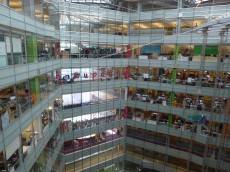January 2, 2014
Take up of office space in Central London at highest level in six years
Take-up of office space in Central London was almost 11m sq ft in 2013, way above the 2012 figure of 7.3m sq ft and an increase of more than 50 per cent year-on-year. According to the latest figures from Cushman & Wakefield, leasing activity to December increased across all Central London markets, with transaction volumes 22 per cent above the five-year average. It says that the number of transactions over 50,000 sq ft was a major driver of leasing volumes, with 30 deals signed during 2013 – the highest number since 2007. The Media and Technology sector saw most activity across Central London, accounting for 36 per cent of all letting volumes in 2013, up from 23 per cent in the preceding two years. (more…)
























January 6, 2014
The nine enduring workplace tensions to keep an eye on in the year ahead
by Mark Eltringham • Comment, Facilities management, Flexible working, Public Sector, Technology, Workplace